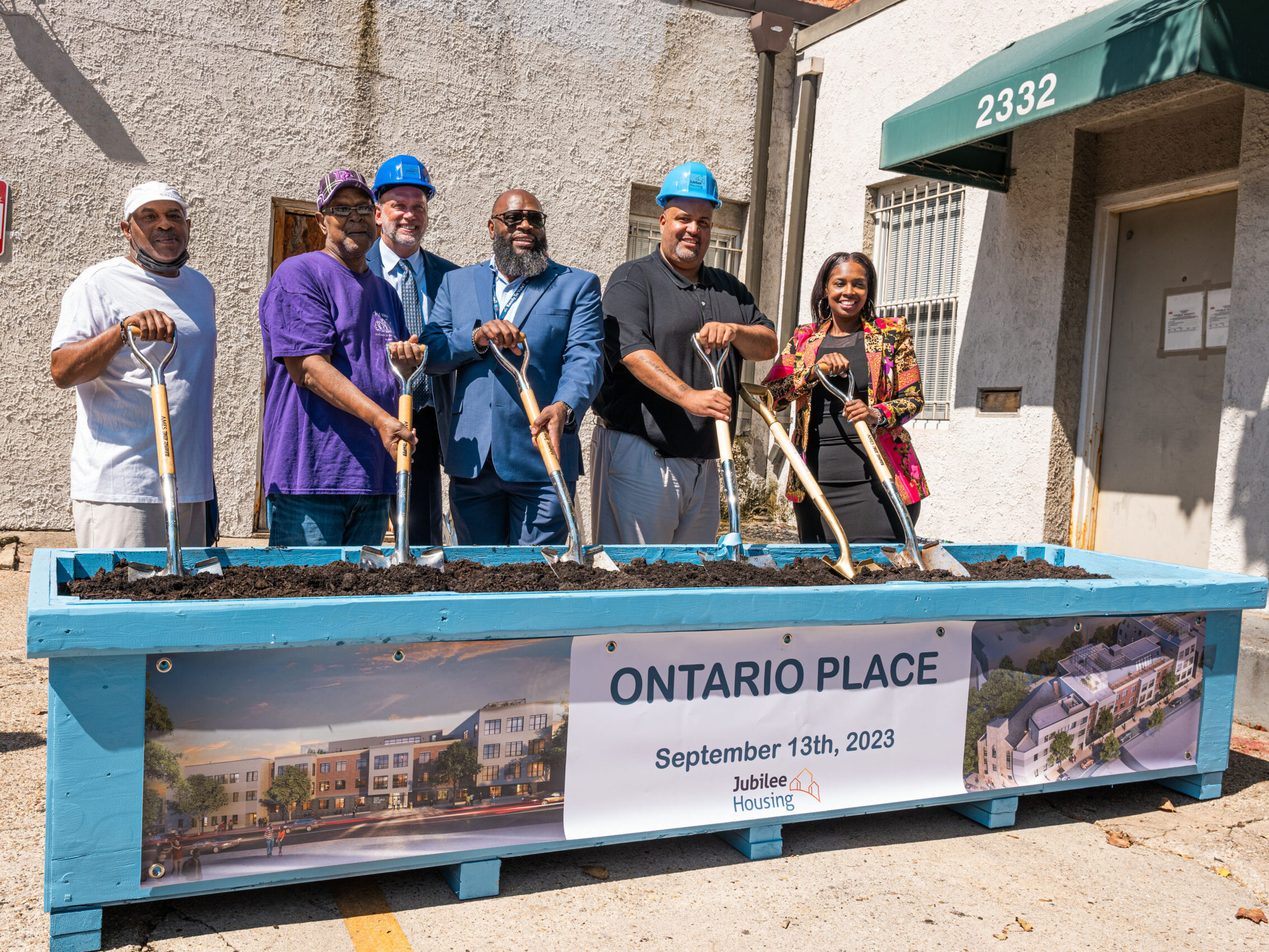For over 50 years, Jubilee Housing has worked to foster access to resources and opportunities, reduce the equity gap, and bring about justice through housing — Justice Housing. During this Jubilee Year, we have recommitted ourselves to some of our founding principles that are part of this biblical tradition: Filling Gaps, Breaking Down Boundaries, and Resetting the System. There is no better example of these values than Jubilee’s Reentry Housing and Services program and our advocacy for returning citizens through public policy and funding, a testament to our unwavering commitment to Justice Housing.
Jubilee has provided a supportive reentry housing program in the Adams Morgan area for twelve years, serving over 600 returning citizens without a single disruption to the neighborhood. The Reentry Housing Initiative provides transitional housing and wrap-around services for men and women who are looking to rebuild their lives in a supportive, drug- and alcohol-free environment. Jubilee currently operates two reentry homes, which serve up to ten women and ten men at a time, and a floor in another building dedicated to long-term housing. This month, we detail the founding of this program and talk to staff and program participants to get their perspectives.
50th Anniversary Stories
The Road to Reentry Housing at Jubilee
How Jubilee Housing got its start creating affordable housing and services for citizens looking to rebuild their lives after incarceration.
By Dave Mesrey
Jubilee Housing’s innovative reentry program for DC’s returning citizens was officially founded in 2011, but its origins go back even further.
One of the seeds for the program was planted in the early 1980s when longtime Jubilee colleague Dr. Janelle Goetcheus helped create a first-of-its-kind community health center in DC for people who had been released from local emergency rooms but had nowhere to go to recover.
Another seed took root in 2006 when Dr. Goetcheus and the nonprofit Unity Health Care launched a groundbreaking community-based correctional healthcare program at the DC jail.
Those were the days, says Jubilee President and CEO Jim Knight, when “inmates were still being released in the middle of the night in an orange jumpsuit and told, ‘Here’s your bus fare — don’t come back.’”
Then, in 2007, Knight, along with other neighborhood missions, was invited by Jubilee founder Rev. Gordon Cosby to meet with Dr. Goetcheus and learn what a challenge it was to bring humanizing healthcare to a place like the DC jail.
Knowing Dr. Goetcheus and being inspired by her work and colleagues, Knight soon realized that many of the District’s returning citizens also needed a stable place to return to, with housing and services, and that maybe Jubilee Housing could expand its mission and programmatic offerings and help address this significant issue.
Housing First
In 2007–08, when the Housing First model was still in its infancy, Knight and his colleagues studied research funded by the Corporation for Supportive Housing and the William S. Abell Foundation about citizens considered the “hardest to house.”
These were people who would cycle in and out of emergency rooms and shelters and jails, with a profile that made it hard for them to succeed in traditional housing.
At the time, Jubilee had around 250 apartments in the city, but none were available. But even if they were, Knight thought, would a traditional lease be the best option for people in their days home from prison?
“If you’ve got someone who’s getting out after many years in prison, or even several months for that matter, with no resources, no employment, and no credit,” Knight says, “how are they going to qualify for an apartment and find a path forward to turn their lives around?”
“And if we’re an affordable-housing landlord that wants to serve this population, but even we don’t think the move straight into an apartment is necessarily the right answer, then what is?”
One day at a routine City Council budget meeting, Knight found himself randomly sitting next to a man who’d just been released from prison the week before.
With affordable housing scarce and well-paying jobs hard to come by, the man spoke up and said, “Why is it that in order to have a bed and a roof and something to eat, I’ve gotta go break a law and go to jail?”
“His comments just pierced the room,” Knight says. “And ever since that day, his words have echoed in my ears.”
The coffee house
Knight can often be found working from a coffeehouse in Adams Morgan, and one morning while he was looking out the shop’s front window, his eyes came to rest on a burned-out, boarded-up building across the street.
Soon after, he spotted a banner on the building that read, “Auction: Property foreclosure sale next week.”
That’s when he thought, “Could this be a home for returning citizens?”
After much discussion with Jubilee’s leadership and board of directors, Knight showed up at the auction the following week, hoping for a miracle. With a bit of luck and a lot of teamwork, Jubilee was able to purchase the property.
And although the building was in rough shape, Jubilee was eventually able to rehab it.
Amid the building’s lengthy rehab process, Jubilee developed the concept for a yearlong transitional housing program for some of the city’s returning citizens. The idea was that if someone finished a year of transitional housing, Jubilee could vouch for them in their next steps.
A time of transition
Today, that building and another that houses female returning citizens serve as the cornerstones for Jubilee’s groundbreaking transitional housing program. Jubilee also has a floor in one of its apartment buildings dedicated to long-term housing for people who’ve turned their lives around.
“We realized that we can be the referral voice to our own apartments and to third-party apartments,” Knight says. “We could be the ones who verify the fact that someone is gainfully employed, they’ve followed rules, and they’ve developed positive habits, including paying rent.”
Jubilee isn’t the only organization doing this kind of work in The District, but it’s a short list. Jubilee’s Reentry Housing Initiative provides supportive transitional housing and wraparound services for men and women who are looking to rebuild their lives in a supportive, drug- and alcohol-free environment.
“Housing is absolutely necessary for a successful transition back to the community,” Knight says, “and providing secure, healthy housing is the cornerstone of our program.”
Jubilee also offers reentry residents support in finding employment, mental health counseling, recovery, and family reunification.
“The recidivism rate in our reentry program is very low,” Knight says. “When you have safe and affirming housing, life is a lot easier. One of the reasons for the program’s success is that our staff is truly engaged with our residents. We give them a safe place to be and the best chance to be their best selves.”
The future of reentry housing
Today, mass incarceration is still one of the biggest discriminatory problems plaguing the country. To help address the issue, Jubilee is in the process of reprogramming its existing reentry houses as it prepares two groundbreaking new developments, on the site of the former King Emmanuel Baptist Church and the adjacent Ontario Place, in order to create an extended continuum of housing, services, support, and comprehensive workforce development opportunities for citizens with justice involvement.
Knight is inspired by the work of social justice activist and Equal Justice Initiative Executive Director Bryan Stevenson, who once said, “Each of us is more than the worst thing we’ve ever done.”
“We should not be defined by our worst mistake,” adds Knight. “We all need an opportunity for redemption. People who end up taking the wrong path are usually people who have not had the right opportunities and support. I’m more worried about people who don’t have housing with structure than I am about people who do have housing with structure.”
With these new developments coming soon to Adams Morgan and an innovative, rooftop aquaponics farm along with them, Knight firmly believes that the experience of buying fresh produce from someone who just got out of prison, who grew it, harvested it, and tells you their life story will go a long way toward opening hearts and minds to our common humanity.
“We really are going to humanize each other in the process,” Knight says, “and we hope to help the District be a more human place to be.”
Longtime Detroit-based journalist Dave Mesrey is an SPJ Award–winning writer and editor of magazines, books, and news sites, including the Detroit Metro Times, and ESPN’s Grantland.com. In 2021, Mesrey wrote a series of stories in the Metro Times that led to the release of artist and former Golden Gloves boxing champion Ray Gray after Gray had served 48 years in prison for a murder he almost certainly did not commit.
Mesrey has also edited the biographies of Detroit sports legends Willie Horton and Lem Barney and, for BLAC Detroit magazine, chronicled the storied relationship between Lem Barney and Motown legend Marvin Gaye.

